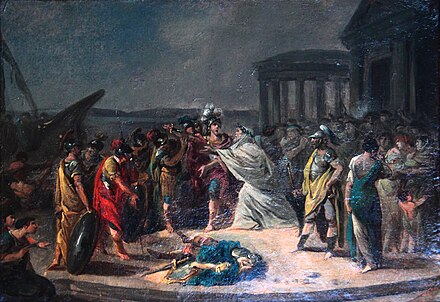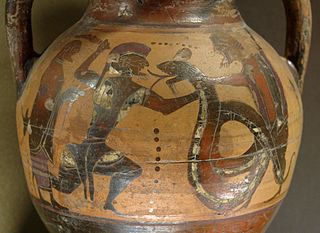
In Greek mythology, Idomeneus ( /aɪˈdɒmɪˌniːəs/ ; [1] Greek : Ἰδομενεύς) was a Cretan commander, father of Orsilochus, Cleisithyra and Iphiclus, son of Deucalion and Cleopatra, [2] grandson of Minos and king of Crete. He led the Cretan armies to the Trojan War [3] and was also one of Helen's suitors as well as a comrade of the Telamonian Ajax. Meriones was his charioteer and brother-in-arms.

Greek mythology is the body of myths originally told by the ancient Greeks. These stories concern the origin and the nature of the world, the lives and activities of deities, heroes, and mythological creatures, and the origins and significance of the ancient Greeks' own cult and ritual practices. Modern scholars study the myths in an attempt to shed light on the religious and political institutions of ancient Greece and its civilization, and to gain understanding of the nature of myth-making itself.

Greek is an independent branch of the Indo-European family of languages, native to Greece, Cyprus and other parts of the Eastern Mediterranean and the Black Sea. It has the longest documented history of any living Indo-European language, spanning more than 3000 years of written records. Its writing system has been the Greek alphabet for the major part of its history; other systems, such as Linear B and the Cypriot syllabary, were used previously. The alphabet arose from the Phoenician script and was in turn the basis of the Latin, Cyrillic, Armenian, Coptic, Gothic, and many other writing systems.

Crete is the largest and most populous of the Greek islands, the 88th largest island in the world and the fifth largest island in the Mediterranean Sea, after Sicily, Sardinia, Cyprus, and Corsica. Crete and a number of surrounding islands and islets constitute the region of Crete, one of the 13 top-level administrative units of Greece. The capital and the largest city is Heraklion. As of 2011, the region had a population of 623,065.













